- Главная
- ООЗЖ «Эгида»
- Новости
- Каталог
- Форум
- Доска объявлений
- Энциклопедия
- Фото
- Видео
EGIDA.BY
Благотворительный портал защиты и прав животных
This report documents how dogs and cats which were absolutely healthy before they were caught and brought to "Fauna city" catch infectious diseases and why dogs kept by "Fauna city" are killed after first sneezing.
 (this is a photo of original of the answer in Russian language). The gist of this letter is best reflected in the third and fourth paragraphs. In essence it is stated that the final diagnose for the dog's sickness could not be defined. Later, during a private conversation on 12th of December 2009, Mr Sergey Isachenko, the veterinarian dealing with the case of Sonya, said all the symptoms were hinting at distemper. However, because of the absence of modern diagnostic methods in Belarus for virus diseases of this sort it is impossible to publish an according official diagnose.
(this is a photo of original of the answer in Russian language). The gist of this letter is best reflected in the third and fourth paragraphs. In essence it is stated that the final diagnose for the dog's sickness could not be defined. Later, during a private conversation on 12th of December 2009, Mr Sergey Isachenko, the veterinarian dealing with the case of Sonya, said all the symptoms were hinting at distemper. However, because of the absence of modern diagnostic methods in Belarus for virus diseases of this sort it is impossible to publish an according official diagnose.
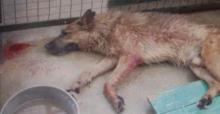 (this photo was taken one hour later by a volunteer in "Fauna city" where this dog was brought). The dog was severely beaten by the catcher of animals with, a Mr. Sinitsa, during the transport from the place of capture to "Fauna city". On the next day the dog was killed by the veterinarian of "Fauna city".
(this photo was taken one hour later by a volunteer in "Fauna city" where this dog was brought). The dog was severely beaten by the catcher of animals with, a Mr. Sinitsa, during the transport from the place of capture to "Fauna city". On the next day the dog was killed by the veterinarian of "Fauna city".
Persons who had witnessed what had happened to the dog tried to bring Sinitsa to court for his cruelty. For two months people wrote innumerous complaints, applications, letters and went to various institutions. It didn't result in anything. The official response read: "... the dog was killed on the next day because of suspicion of a virus disease. This was certified by the assistant of veterinarian working on "Fauna city"."
However, in a private conversation the assistant said that on the day of arrival the dog had broken chap and paw, head injury and internal hemorrhage.
Let us in the beginning introduce Mrs Natalya Belanova and explain what "Fauna city" is. Natalya Belanova has been the chairman of the animal protection organisation "Egida" of Minsk since 2006. In 2007 a new administrative entity, "Fauna city", was established by the Minsk authorities as «institution for collecting and exterminating stray animals» which in the beginning was part of a big transport enterprise dealing with collecting and disposing of garbage. The main function of "Fauna city" is catching, keeping for a certain time and eventually killing stray dogs and cats of Minsk. On request of "Egida" the appointment of a deputy director on animal protecting activities was agreed. "Egida" chairman Natalya Belanova worked in this position from summer 2007 until January 2009.
During this time the population of Minsk successfully cooperated with the state institution. A powerful volunteers' movement began its work. The volunteers did a lot for the animals kept by "Fauna city" - they gave injections against viruses to newly arrived animals, brought them to veterinarians, bought drugs, drew up animal profiles in order to find new owners. All of this was done at these persons´ own costs because they understood that the state doesn't have or doesn´t want to spend money to provide stray cats and dogs with sufficient treatment.
One of the main problems of "Fauna city" is its building which was planned and built without any experience in such constructions. Therefore, there is no ventilation. There is no outflow for excrements. The floor in the cages is concrete and straight. The dogs´ excrements are cleaned of with water from a hose. Often dogs stand in dirty and contaminated water. In such conditions microbes and viruses spread very quickly.
 Unfortunately, there was no money for the renovation of the building. The funding transferred from the budget of Minsk was not sufficient to cover all expenses of "Fauna city". Absurdly, the city administration expected their stray animal center to work profitably, just as it were a commercial enterprise. Consequently, they criticized the financial ´loss´.
Unfortunately, there was no money for the renovation of the building. The funding transferred from the budget of Minsk was not sufficient to cover all expenses of "Fauna city". Absurdly, the city administration expected their stray animal center to work profitably, just as it were a commercial enterprise. Consequently, they criticized the financial ´loss´.
Following this, the Minsk city executive committee responsible for "Fauna city" decided to change its strategy. In January 2009 the administration of «Fauna city» was replaced, all workers who were members of animal protection organisations were dismissed, including Natalya Belanova. The new administration quickly adopted new measures for making «Fauna city» profitable: selling caught animals to vivariums for experiments, euthanasia of pets kept at home etc.
Attempts were also made to reduce the number of volunteers, who saw what was happening in "Fauna city" and did not want to be silent about it. First, they were denied to change their clothes in the building and the time of dog walking was limited to uncomfortable times for working people. Volunteers tried to handle all these complications because their affection for the animals. Their patience ran out when they were forbidden to vaccinate animals against virus diseases on their arrival and to treat sick animals. In August of 2009 the head of «Fauna city» stopped to inform them about pending killings of animals.
Despite the hard work of these people, volunteers' activity lost its sense. Usually it went like this: volunteers started to take care of a dog, became attached to it, and looked for new owners. Then this dog got fever, started to cough - until the veterinarian took this dog to the room of euthanasia. The main argument of the administration of «Fauna city» is that medical treatment of animals is not one of their duties. Volunteers finally left "Fauna city" with the hope that the city administration would inquire on their motivation to do so. It didn't happen.
Some time later the volunteers sent a letter to the mayor of Minsk which had been signed 22 persons. In the letter they described all details of infections affecting animals. The volunteers also suggested certain measures in order to prevent mass infection of animals. In its response the city government confirmed the position of «Fauna city» as being a mere keeping place without medical duties.
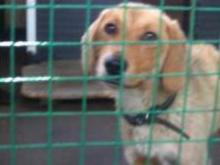 | An example may illustrate the disastrous health situation for animals at «Fauna city». A dog named Sonya was bought out from «Fauna city» on 20th of August 2009. |
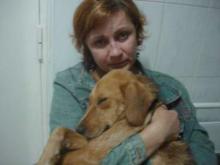 | The volunteers brought this dog to a place not far from the house where Natalya Belanova lives. She decided to take care of this dog. When the first symptoms of a sickness appeared (depression, coughing, fever), Natalya started to fight for the life of the dog Sonya. |
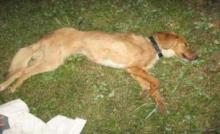 | After one month of uncountable visits to doctors and a lot of money spent on drugs the dog died. After the death of Sonya, on 24th of September 2009, Natalya Belanova supplied a written application to the Chief Veterinary Officer of Belarus, Petr Antonovich. In her letter Natalya asked to determine an institution which could be able to identify what infections are spread in "Fauna city" and to take measures preventing mass infection of dogs and cats with viruses which could be brought later to the houses of new owners and spread in veterinarian clinics. Unexpectedly, the answer did not come from the Chief Veterinary Officer of Belarus, but from the Head Veterinary Surgeon of Minsk. |
 (this is a photo of original of the answer in Russian language). The gist of this letter is best reflected in the third and fourth paragraphs. In essence it is stated that the final diagnose for the dog's sickness could not be defined. Later, during a private conversation on 12th of December 2009, Mr Sergey Isachenko, the veterinarian dealing with the case of Sonya, said all the symptoms were hinting at distemper. However, because of the absence of modern diagnostic methods in Belarus for virus diseases of this sort it is impossible to publish an according official diagnose.
(this is a photo of original of the answer in Russian language). The gist of this letter is best reflected in the third and fourth paragraphs. In essence it is stated that the final diagnose for the dog's sickness could not be defined. Later, during a private conversation on 12th of December 2009, Mr Sergey Isachenko, the veterinarian dealing with the case of Sonya, said all the symptoms were hinting at distemper. However, because of the absence of modern diagnostic methods in Belarus for virus diseases of this sort it is impossible to publish an according official diagnose. The letter also states that it is not possible to substantiate the fact of Sonya´s infection with a virus disease on "Fauna city" due to the absence of additional laboratory studies and an anatomic-pathological autopsy. Why this is impossible, another document explains, i.e. a letter of Mr V. Aleynikov acting as the Head Veterinary Surgeon of Minsk from 24th of September 2009.
The document states that "virological research of unproductive animals [cats and dogs] because of absence of material and technical basis in veterinary laboratories of Belarus is not conducted and in this case is of no economic interest". In effect this means that veterinarians in Belarus are not entitled to identify virus diseases of dogs and cats for the following reason: the General Directorate of Veterinary in Belarus didn't develop and didn't approve of methods of diagnosing virus diseases for unproductive animals, which refers to cats and dogs.
The outcome of the letters of Natalya Belanova and other volunteers was unexpected and tragic. The General Directorate of Veterinary indicated to the administration of "Fauna city" not to sell caught animals to the population. The state institution insisted on this position in the letter to the animal protection organization "Zoosvet" October 2, 2009. This decision was taken in order to ensure that citizens cannot complain later that they had bought a sick dog from "Fauna city".
The «Prohibition on selling animals» in essence permits mass killing of caught stray animals. Understandably, the volunteers feared such a result of their inquiries. However, the worst case scenario became true.
This is not yet the end of the story. On 17th of September 2009 the Head Veterinary Surgeon of Minsk, V.Aleynikov, wrote in a letter that "depending on the decision of a committee at "Fauna city", if an animal under suspicion of a virus disease such an animal is a subject to euthanasia on the day of arrival». The "committee" consists of two persons: a veterinarian and his assistant - who had dealt with euthanasia only until this moment. An animal that merely seems to suffer from a disease is therefore subject to killing.
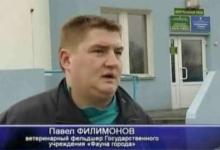 | (veterinarian assistent of "Fauna city"). Due to this position of the administration of the veterinarian service of Belarus the employees of "Fauna city" cannot be held accountable for the killing of animals. For example, the dog on the picture had been caught in the down-town area of Minsk, next to the entrance of the French embassy. A lot of people could watch the process of catching this dog. It was a young and obviously healthy dog. |
 (this photo was taken one hour later by a volunteer in "Fauna city" where this dog was brought). The dog was severely beaten by the catcher of animals with, a Mr. Sinitsa, during the transport from the place of capture to "Fauna city". On the next day the dog was killed by the veterinarian of "Fauna city".
(this photo was taken one hour later by a volunteer in "Fauna city" where this dog was brought). The dog was severely beaten by the catcher of animals with, a Mr. Sinitsa, during the transport from the place of capture to "Fauna city". On the next day the dog was killed by the veterinarian of "Fauna city". Persons who had witnessed what had happened to the dog tried to bring Sinitsa to court for his cruelty. For two months people wrote innumerous complaints, applications, letters and went to various institutions. It didn't result in anything. The official response read: "... the dog was killed on the next day because of suspicion of a virus disease. This was certified by the assistant of veterinarian working on "Fauna city"."
However, in a private conversation the assistant said that on the day of arrival the dog had broken chap and paw, head injury and internal hemorrhage.
The administration of "Fauna city" reacted on that case prohibiting taking photos of the animals kept in the cages. Before such photos were uploaded to the homepages of the animal protection organizations in order to find new owners for the animals. «Fauna city´s» new policy leaves no chance for captured animals to survive.
На сайте: 29
Гостей сайта: 29
Пользователей: 0
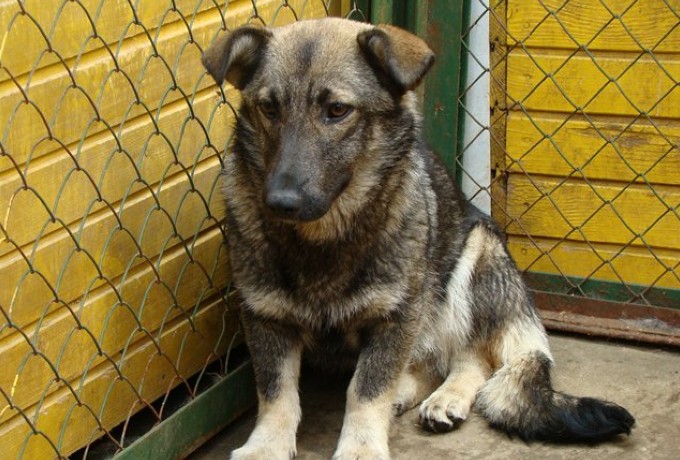
Your comment